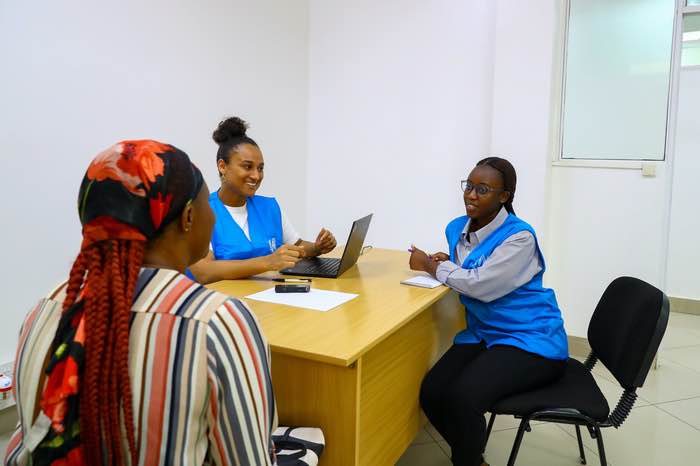
Francine (right) translating during an interview with a refugee. ©UNHCR/Lilly Carlisle
By Francine Uwishema;
At the UN Refugee Agency, UNHCR, the role of translators is pivotal in upholding the protection of refugees and asylum seekers. On International Translation Day, Francine Uwishema, a translator working for UNHCR in Rwanda, tells her story.
Growing up in a multilingual family, I was mostly exposed to Kinyarwanda, Swahili and French. At home, we tended to mix both Kinyarwanda and French. Swahili was also used during conversations with other relatives, including cousins, uncles, aunts and grandparents. So, I was always surrounded by languages and my passion for them never stopped growing.
After my graduation, I started working in the hospitality sector. At that time, I met one professional interpreter who was in Rwanda for a 3-day conference. Impressed by my ability to speak different languages, he encouraged me to pursue my love for languages and even think about helping others overcome language barriers. That’s where it all started.
After years volunteering as a church interpreter, I started thinking about ways of pursuing a career in translation and interpretation, and even gaining more extensive knowledge in this field. During the first year, I didn’t find anything. But I never gave up. Late in 2021, I came across a job opening for an Interpreter on the UNHCR website. Having read the job description, I immediately applied as I was convinced that that was the golden opportunity that I had been waiting for. A few weeks after an interview, a Human Resources staff called and informed me that I was successful.
Today, my responsibilities include translation and interpretation. For translation, I am usually required to translate written information from one language to another. As for Interpretation, the process consists of orally conveying thought, purpose, spirit, emotions and tone of UNHCR staff members or refugees from one language into another during their interactions. This has to be done without adding or omitting any information due to the sensitive nature of many conversations.
In general, translation/interpretation plays a crucial role in the lives of refugees or asylum seekers.
At work, I translate documents for refugees and asylum seekers and help them convey their experiences fully and accurately. My work allows them to provide evidence of a well-founded fear of being persecuted, in the language that they are most comfortable in, while going through asylum or resettlement processes. Without access to translation/interpretation, their applications cannot be processed or may be rejected, which may have serious consequences for their future.
My journey at UNHCR has opened my eyes to the needs of refugees and asylum seekers. Translation is a crucial part of how UNHCR provides protection services and ensures refugees are able to live a life of safety and security. This is at the forefront of my mind every day I walk into the office. [Source: UNHCR Rwanda]. (End).
== ==
Refugees and asylum seekers in Rwanda have access to protection services and those who are eligible are processed for resettlement to third countries, thanks to generous support from our donors such as Norway.
